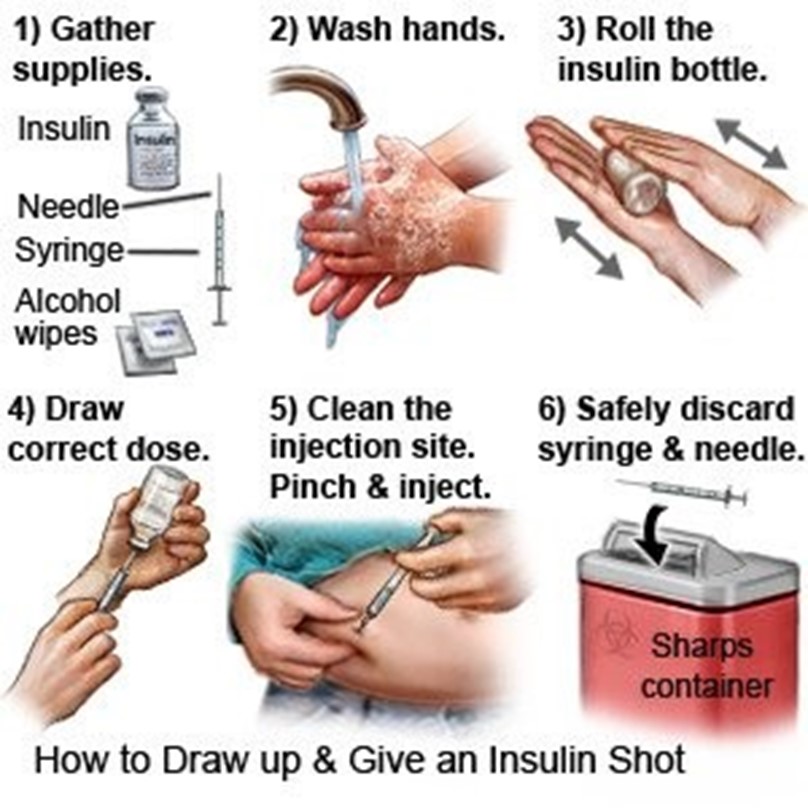A nurse is providing teaching about self-administration of insulin to the parent of a school-age child who has a new diagnosis of diabetes mellitus. Which of the following statements by the parent indicates a need for further teaching?
"The insulin can be injected anywhere there is adipose tissue."
"I will be sure my child rotates sites after 5 injections in one area."
"I will be sure my child aspirates before injecting the insulin."
"The insulin should be injected at a 90-degree angle."
The Correct Answer is C
Choice A: This statement does not indicate a need for further teaching, as it is correct that insulin can be injected anywhere there is adipose tissue. Adipose tissue is the layer of fat under the skin that can absorb insulin and prevent damage to muscles or organs. The common sites for insulin injection are the abdomen, thighs, buttocks, or upper arms.
Choice B: This statement does not indicate a need for further teaching, as it is correct that the child should rotate sites after 5 injections in one area. Rotating sites can prevent lipodystrophy, which is a condition that causes abnormal changes in fat tissue due to repeated injections. Lipodystrophy can affect the appearance and absorption of insulin in the affected area.
Choice C: This statement indicates a need for further teaching, as it is incorrect that the child should aspirate before injecting the insulin. Aspiration is the process of pulling back on the plunger of the syringe to check for blood before injecting the medication. Aspiration is not recommended for insulin injection, as it can cause pain, bruising, or leakage of insulin from the injection site.
Choice D: This statement does not indicate a need for further teaching, as it is correct that insulin should be injected at a 90-degree angle. Injecting insulin at a 90-degree angle can ensure that the medication reaches the adipose tissue and prevents skin irritation or muscle damage. The only exception is if the child has very thin skin or uses very short needles, in which case they may inject at a 45-degree angle.

Nursing Test Bank
Naxlex Comprehensive Predictor Exams
Related Questions
Correct Answer is C
Explanation
Choice A: Smiling when a parent appears is not a manifestation of cerebral palsy, but rather a normal developmental milestone that indicates social and emotional development. An 8-month-old infant should be able to smile spontaneously and responsively at familiar people.
Choice B: Using a pincer grasp to pick up a toy is not a manifestation of cerebral palsy, but rather a normal developmental milestone that indicates fine motor development. An 8-month-old infant should be able to use their thumb and index finger to pick up small objects.
Choice C: Sitting with pillow props, cannot sit independently is a manifestation of cerebral palsy, which is a condition that causes impaired movement and posture due to brain damage or abnormal development. An 8-month-old infant should be able to sit without support and maintain balance. Sitting with pillow props, cannot sit independently indicates poor muscle tone, strength, or coordination.
Choice D: Tracking an object with eyes is not a manifestation of cerebral palsy, but rather a normal developmental milestone that indicates visual development. An 8-month-old infant should be able to follow an object or person with their eyes in all directions.
Correct Answer is A
Explanation
Choice A: This action is appropriate for a 10-year-old child who will be hospitalized for an extended period of time, as it meets their psychosocial needs according to Erikson's stage of industry versus inferiority. In this stage, which occurs from age 6 to 12 years, children develop a sense of competence and achievement by mastering skills and tasks that are valued by society. Encouraging the client to complete school work can help them maintain their academic progress and self-esteem.
Choice B: This action is not appropriate for a 10-year-old child who will be hospitalized for an extended period of time, as it does not meet their psychosocial needs according to Erikson's stage of industry versus inferiority. In this stage, which occurs from age 6 to 12 years, children need consistency and structure to develop a sense of competence and achievement. Varying the child's schedule each day can cause confusion and stress for them.
Choice C: This action is not appropriate for a 10-year-old child who will be hospitalized for an extended period of time, as it does not meet their psychosocial needs according to Erikson's stage of industry versus inferiority. In this stage, which occurs from age 6 to 12 years, children need opportunities to master skills and tasks that are valued by society. Providing a daily session with a play therapist can help them cope with their emotions and fears, but it does not help them develop their competence and achievement.
Choice D: This action is not appropriate for a 10-year-old child who will be hospitalized for an extended period of time, as it does not meet their psychosocial needs according to Erikson's stage of industry versus inferiority. In this stage, which occurs from age 6 to 12 years, children need social support and peer interaction to develop a sense of competence and achievement. Discouraging visits from the client's friends can cause isolation and depression for them.
Whether you are a student looking to ace your exams or a practicing nurse seeking to enhance your expertise , our nursing education contents will empower you with the confidence and competence to make a difference in the lives of patients and become a respected leader in the healthcare field.
Visit Naxlex, invest in your future and unlock endless possibilities with our unparalleled nursing education contents today
Report Wrong Answer on the Current Question
Do you disagree with the answer? If yes, what is your expected answer? Explain.
Kindly be descriptive with the issue you are facing.
